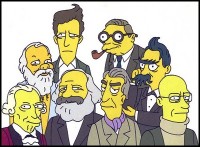PACTISS recommends

Where science meets art. The only necessary and sufficient book store in Melbourne.
Hope our friends enjoy the new look and feel – now optimised for mobile devices for access on the go.

PEOPLE
-
Coordinator: Peter Ellerton
Web guy: Jason Etheridge RESOURCE COLLECTIONS
NEW RESOURCES
-
- A nice Philosophy of Mind summary
- The power of categorical logic
- What exactly is the scientific method and why do so many people get it wrong?
- Paralympic athletes faster than olympic athletes — what does this tell us about difference?
- Logic: if + then = why? How can we understand the power of logic?
- How do we ensure we are exposed to new ideas? A parody with bite.
- A Life of Meaning (Reason Not Required) – What is the nature of our relationship with reason?
- Can you name this cognitive bias?
- By what measures can we value human life?
- Teaching philosophy improves standardised scores
- Are we in control of our own decisions?
- Neuroscience and education: myths and messages
- Free will is not as free as we think – and that’s ok.
- Where’s the Proof in Pseudoscience?
- Science in the lead?
RANDOM POSTS
-
- The Tale of the Slave
- Science in the lead?
- The power of the non sequitur
- Why do humans reason? Arguments for an argumentative theory
- David Papineau on Scientific Realism
- Scientists and Global Warming (Does the analogy hold?)
- Where's the Proof in Pseudoscience?
- Honesty and Charity in Arguments
- Misunderstanding Statistics
- The value of subjective experience (or not)
USEFUL RSS FEEDS
 Philosopher’s Zone
Philosopher’s Zone NYTimes – The Stone
NYTimes – The Stone Philosophy Now
Philosophy Now RSA Animate
RSA Animate- The Green Corridors Initiative
- Governance governing government
- Why print money when we can print wealth?
- Building a resilient health and care system
- We'll always have Paris?
- Experimentation and equity in global cities
- Technology-enabled deliberative democracy
- Healthier placemaking
- Creating a sovereign wealth fund in Wolverhampton
- Economic recovery and climate action
 Scientific American – Mind and Brain
Scientific American – Mind and Brain- Asexuality Research Has Reached New Heights. What Are We Learning?
- Political Ads Can Target Your Personality. Here's What Could Go Wrong
- Why Writing by Hand Is Better for Memory and Learning
- People with Myalgic Encephalomyelitis/Chronic Fatigue Syndrome May Have an "Exhausted" Immune System
- How to Close the 'Orgasm Gap' for Heterosexual Couples
- Virtual Bar Scenes Are a New Tool to Study Why People Commit Crimes in the Heat of the Moment
- Anger Can Help You Meet Your Goals
- How Sleep Engineering Could Help Heal the Brain
- Dominatrices Are Showing People How to Have Rough Sex Safely
- Farmers in Crisis, Long Overlooked, Are Finally Getting Mental Health Support
 TED talks
TED talks- War journalism should be rooted in empathy — not violence | Bel Trew
- The problem with food and climate — and how to fix it | Jonathan Foley
- How buildings can improve life — inside and out | Doris Sung
- The satellite helping slow climate change — right now | Millie Chu Baird
- What's possible when the arts belong to everybody | Lear deBessonet with Brian Stokes Mitchell
- “Cant de la Sibil·la” / "Quien Más Me Ama" | Maria Arnal
- Bravery, brilliance and RuPaul Charles | On the Spot | RuPaul Charles
- How to claim your leadership power | Michael Timms
- Why young people are worse off than their parents — and what to do about it | Scott Galloway
- Quantum computers aren't what you think — they're cooler | Hartmut Neven
THEMED RESOURCES
- July 2024MonTueWedThuFriSatSun123456789101112131415161718192021222324252627282930311234
Author Archives: Peter Ellerton
Developing critical thinking skills
A useful handout that talks about reading, writing and thinking critically with examples of how to achieve this. via http://sydney.edu.au/stuserv/documents/learning_centre/critical.pdf Critical Thinking Skills (pdf)
Language as a Window into Human Nature
Another excellent video from RSA Animate http://comment.rsablogs.org.uk/videos/
Critical Thinking – An Introduction (Alec Fisher)
This ebook is widely available for download on the web. I got it here www.axzopress.com/downloads/pdf/1560526483pv.pdf Critical thinking introduction (pdf) A good resource for referencing what we mean by critical thinking.
The power of the non sequitur
From www.dilbert.com of course…
Anecdotal Evidence cartoon
via smbc
How Anecdotal Evidence Can Undermine Scientific Results
Why subjective anecdotes often trump objective data By Michael Shermer | July 25, 2008 | 27 http://www.scientificamerican.com/article.cfm?id=how-anecdotal-evidence-can-undermine-scientific-results The recent medical controversy over whether vaccinations cause autism reveals a habit of human cognition—thinking anecdotally comes naturally, whereas thinking scientifically does not.
Philosophical Health Check
This is a fabulous online interactive to see how coherent your beliefs and values are as a whole (tpm online) Check your [philosophical]Tension Quotient! To take the philosophical health check (PHC), go through the statements below, selecting for each one … Continue reading
Happiness, Philosophy and Science
By GARY GUTTING NYTimes ‘The Stone’ http://opinionator.blogs.nytimes.com/author/gary-gutting/ Extract below (useful bit) The new research has both raised hopes and provoked skepticism. Psychologists such as Sonja Lyubomirsky have developed a new genre of self-help books, purporting to replace the intuitions … Continue reading
Universal intelligence: One test to rule them all
It’s time to abandon the idea that we are the gold standard of intelligence. Take a test using a more fundamental scale of smarts http://www.newscientist.com/article/mg21128296.100-universal-intelligence-one-test-to-rule-them-all.html?full=true&print=true Download Universal intelligence (pdf)
The Meaningfulness of Lives
By TODD MAY NYTimes ‘The Stone’ http://opinionator.blogs.nytimes.com/2011/09/11/the-meaningfulness-of-lives/ Who among us has not asked whether his or her life is a meaningful one? Who has not wondered — on a sleepless night, during a long stretch of dull or taxing work, or … Continue reading
Peace of Mind: Near-Death Experiences Now Found to Have Scientific Explanations
Seeing your life pass before you and the light at the end of the tunnel, can be explained by new research on abnormal functioning of dopamine and oxygen flow By Charles Q. Choi Scientific American http://www.scientificamerican.com/article.cfm?id=peace-of-mind-near-death Near-death experiences are often thought of … Continue reading
Homeopathic leak threatens catastrophe
What is the role of humour here…? http://www.newsbiscuit.com/2011/09/09/homeopathic-leak-threatens-catastrophe/ An accidental release of highly dilute homeopathic waste from a research institute in Swindon has led to calls for the centre to be shut down. Plant operators have admitted responsibility for massive … Continue reading
Conditional Happiness
If you can read the fine print….. Discuss.
Posted in Media Articles, Cartoons
Leave a comment
Japanese Linguist Helps Revive an Aboriginal Language
What does it mean for the world to lose a language? http://www.abc.net.au/am/content/2011/s3310650.htm TONY EASTLEY: It’s taken 40 years but from almost the ashes of extinction, an Aboriginal language has been saved and is again being spoken on Palm Island in … Continue reading
A Utilitarian Decision – Sacrifice Lives to Save Lives
Would the lives of the people on board have been worth it…? Discuss. AN F-16 pilot scrambled on 9/11 to prevent another attack on the US capital says she was prepared to ram her plane into a hijacked aircraft, as … Continue reading
20 Awesomely Untranslatable Words from Around the World
There are at least 250,000 words in the English language. English – or any language – could never hold enough expression to convey the entirety of the human experience
